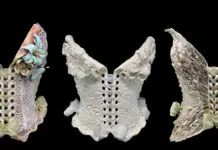To put Curly Lewis’ remarkable career in perspective, consider that he first began his association with popular music icon Bob Wills back in 1936 – four years before the hit song “San Antonio Rose” took the Wills band “from hamburgers to steaks,” as Bob famously said, and only a couple of years after the bandleader had landed in Tulsa, following stops in his native Texas and Oklahoma City.
After establishing a Tulsa presence, fiddler-vocalist Wills and his Texas Playboys, including his brother Johnnie Lee, would hone and perfect the then-new Southwestern musical stew known as Western swing.
Granted, Lewis was only 11 years old in ’36. But he’d been playing the fiddle since he was 9, and he was good enough at it that, unbeknownst to him, one of his brothers entered him in a Wills-sponsored competition.
“My brother Pres was 17 at the time, and he was down by the old Avery Coliseum in downtown Tulsa one day. They were signing people up for a fiddling contest, so he went in there and signed me up for it,” recalls Lewis with a chuckle.
“I didn’t know anything about it, and it made me kind of mad when I found out.”
The competition itself was held at the Avery, which, as Lewis points out, “took up a whole block – that’s where they had all the big shows back in that time,” and this event certainly qualified.
“It was a three-night deal, and there were 67 old-time fiddle players from seven different states,” he says. “They didn’t have any categories for age. It was just for everybody. They started with all 67 fiddle players and cut it down to 25 the first night. I was number nine. The next night, they cut it down to 10, and I came in number six. My brother kept telling me, ‘You keep coming down three (places) at a time, and you’ll make it.’”
Pres Lewis turned out to be correct.
“On the third night, there was 10 of us, and they had two contests that night. Out of the 10, the first three got into the grand finale. I came in number three on that. And then, in the grand finale, I was lucky enough to come out on top. I got $10 for third place out of the 10, and $100 for winning the grand prize. That’d be equal to a couple of thousand dollars now, just about. Dad bought me a brand-new blue serge suit. I never will forget that. Paid $17 for it. I was really dressed to the nines.”
And so began a career as a musician that would take Lewis all over the country with both Bob and Johnnie Lee Wills as well as the top Western-swing bandleaders Hank Thompson and Leon McAuliffe. Along the way, he would record for a number of different labels, including RCA, and become one of the best-known swing fiddlers of all time.
Although he would sometimes sit in with Bob Wills’ band after winning the competition, Lewis really got started with Johnnie Lee, the second-oldest of the four musical Wills brothers. After establishing Tulsa’s Cain’s Ballroom as the Carnegie Hall – or Ryman Auditorium – of Western swing, and flame-throwing radio station KVOO as the means of getting his live shows out over much of America, Bob Wills left Tulsa to join the Army, leaving the daily broadcasts from the Cain’s and the local dances to his younger brother Johnnie Lee. That was in 1942. Two years later, with World War II raging overseas, 20-year-old Lewis – who was not eligible for service – first took the stage as a member of Johnnie Lee Wills and His Boys.
a number of different labels, including RCA, and
become one of the best-known swing fiddlers of all time.”
“I’d been working with a woman named Billie Walker,” he recalls. “She had an early-morning, 5:30 a.m., radio show over at (Tulsa station) KTUL. She was a singer and wore a big bonnet – real old-timey. Johnnie Lee had been listening to our program in the morning, and, of course, he knew me anyway. So one Saturday night he had me come up and sing a few songs, and he wanted me to come back on Tuesday. So I went back on Tuesday, and I went to work for him. I was in Oklahoma City with ‘em that night.”
In addition to singing, Lewis initially played guitar with the Wills band, switching back to the fiddle in 1946. He’d remain with Johnnie Lee’s outfit for just about a decade, leaving to do six months with Bob Wills – who had relocated to California – and then coming back to Tulsa, where he rejoined Johnnie Lee’s band for several months. Next came a run with Hank Thompson, a nationally known act working out of Oklahoma City.
In the late ‘50s, Lewis spent time with the Cimarron Boys, led by McAuliffe, a Texas Playboys alumnus who had gotten his own group and his own Tulsa ballroom, the Cimarron, which was the Cain’s major rival. Long after those days, when both men had dissolved their bands but were still picking up occasional gigs, Lewis would continue to play shows with them.
“I was with Johnnie Lee up until he died,” says Lewis, “and Leon until he died.”
He also continued to perform with Hank Thompson’s Brazos Valley Boys and the Texas Playboys bands formed after Bob Wills’ death until a few years ago, when various injuries and illnesses stilled both his singing voice and his fiddle.
Today an octogenarian, Lewis lives in an immaculate apartment in Tulsa. The few items displayed on its wall include a photo of Hank Thompson with Lewis and the rest of the Brazos Valley Boys from 1967, plaques commemorating his 1994 induction into the Texas Western Swing Hall of Fame and the 2003 Texas music festival that bore his name, and a framed platinum CD of the Tractors’ debut disc from 1994, which featured Lewis on one of its tracks. A few miles away, another acknowledgement lies imbedded in the sidewalk outside the Cain’s Ballroom; it’s his star on the Cain’s Walk of Fame. He’s the only sideman to be so honored.
In the late ‘50s, weary of the road or simply wanting to be home more with his family, Lewis took a couple of stabs at non-musical jobs. He ran a dry-cleaning pickup station in Tulsa for a few months, and later began driving his own dump truck, working with his former Johnnie Lee Wills bandmate, Clarence Cagle.
“I liked that,” he says of the latter job. “I did it for about two months, and I was doing good. Then I was going to work one morning, and it was foggy. I was pulling across the intersection of Pine and Yale when my truck died on me. I was out there with the hood up, looking to see what was the matter, when I heard tires squeal. I ducked down, and an old boy hit right in the back end of that truck. Knocked it about 30 feet, and just completely totaled it.”
He pauses a moment, remembering.
“Then,” he says, “I went to work for Leon McAuliffe.”
Thanks to Brett Bingham for his interviewing assistance.
The Oklahoma Jazz Hall of Fame has scheduled a Curly Lewis Tribute concert for July 21, featuring several noted Western-swing performers joining emcee John Wooley for a musical retrospective of Lewis’ career. For more information, call the Hall at 918.28.-8609 or visit www.okjazz.org.

























